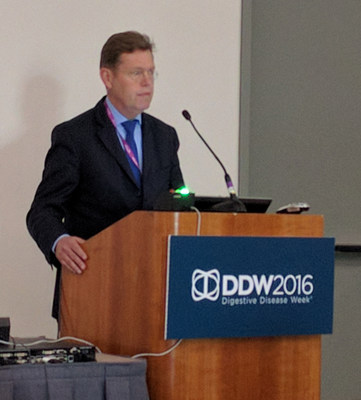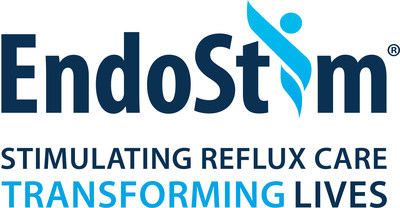New Data On EndoStim Therapy For The Treatment Of Gastro-Esophageal Reflux Disease (GERD) Presented At Digestive Disease Week 2016
ST. LOUIS and NIJMEGEN, The Netherlands, May 31, 2016 /PRNewswire/ -- EndoStim, Inc., a medical device company, today announced new data were presented on its new neurostimulation therapy for gastroesophageal reflux disease (GERD) at the 2016 Digestive Disease Week (DDW) meeting in San Diego, California. The four presentations included analyses of: one year results of an international multi-center study of EndoStim therapy for refractory GERD; and interim results from EndoStim's international patient registry.

EndoStim has developed a unique, minimally-invasive implantable device designed to provide long-term reflux control by restoring normal esophageal function through low-energy personalized neurostimulation. The therapy directly targets the patient's weak or dysfunctional lower esophageal sphincter (LES) muscle between the stomach and the esophagus, often the underlying cause of reflux.
Presentations included:
- One year results of an international multi-center study of EndoStim therapy for refractory GERD
This report included data from 37 patients from 10 sites and was presented at the podium by Prof. Peter Siersema, MD, PhD, Professor of Gastrointestinal Endoscopy at Radboud University Medical Center, Nijmegen, the Netherlands, and the principal investigator of this multicenter study.
"The treatment of GERD is evolving, and I believe EndoStim therapy will play a major role in shaping the future of reflux care," said Prof. Siersema. "The consistency in the safety and efficacy outcomes in our international multi-center trial with the other ongoing EndoStim trials is impressive and very encouraging. The longevity of these data suggests that the therapy is durable for long-term reflux control." Prof. Siersema added that the results show a significant and sustained drop in esophageal acid exposure from a median of 10% at baseline to 4.4% - near normal levels, at one year follow-up, allowing for 81% of patients to completely stop use of proton pump inhibitor (PPI) medication.
- Interim results from EndoStim's international patient registry
This study reported interim results of a prospective multi-center observational registry of lower esophageal sphincter stimulation for GERD. To date, 138 patients have been enrolled at 11 sites. Results were reported by Prof. Joachim Labenz, MD, Professor and Chair of the Department of Internal Medicine, Diakonie Klinikum, Siegen, Germany, who commented: "It is encouraging to see that the safety and effectiveness of LES stimulation in international trials are replicated in a routine clinical practice setting. We are also observing the reduction in health care resource utilization of patients after receiving EndoStim."
- Four year outcomes of EndoStim therapy
This study reported long term results of a single center study of Electrical Stimulation Therapy (EST) of the Lower Esophageal Sphincter (LES) for treating GERD. Prof. Edy Soffer, MD, Professor of Gastroenterology, University of Southern California, Los Angeles, USA, and the presenter of the abstract commented: "The profound and sustained improvement in both acid exposure and GERD symptoms over a prolonged follow-up of four years along with the low rate of adverse events and side effects very encouraging for a GERD therapy."
- Effect of EndoStim on reflux mechanisms in GERD patients
This study is the first to evaluate the effect of LES stimulation on reflux mechanisms, especially on transient LES relaxations (TLESRs) believed to be the most important and prevalent mechanism of reflux. Dr. José Conchillo, MD, PhD, Assistant Professor at the Department of Gastroenterology and Hepatology, Maastricht University Medical Centre (MUMC), Maastricht, The Netherlands, and the senior author of the study commented: "The study demonstrated that LES stimulation significantly reduced the total number and duration of TLESRs and number of TLESRs associated with reflux, and suggests this reduction in TLESRs is one of the mechanisms by which EndoStim therapy improves acid exposure and GERD symptoms."
The Lost Reflux Patient
Additionally, an independent study revealing a significant group of under-diagnosed and inadequately-treated GERD patients in community clinics in Germany termed "Lost Patients," was presented at DDW by Prof. Joachim Labenz. The "LOPA" study shows that under-treated GERD patients are often overlooked in general practice and highlights the need for regional interdisciplinary reflux centers.
- Inadequate Symptom Control on Long-Term PPI Therapy in GERD Fact or Fiction?
The "Lost Patient," or "LOPA," study of 333 GERD patients seen in 16 general practice clinics in Germany revealed almost half of the patients taking PPI medication for more than 1 year complain of heartburn or regurgitation symptoms at least 2 days per week despite their medication. Fourteen percent of these patients were considered "Lost Patients" with established diagnosis of GERD, insufficient efficacy of PPI therapy, and no previous attempt to identify the reason(s) for insufficient PPI effect. According to Prof. Labenz, "These patients should be methodically identified and considered for further diagnostics and/or treatment modification. Interdisciplinary reflux centers can play an important role in improving the care of these patients."
About EndoStim
EndoStim is a medical device company based in St. Louis, Missouri, and Nijmegen, The Netherlands, developing and commercializing a revolutionary treatment for GERD. The EndoStim system is CE Marked for patients with gastro-esophageal reflux disease with symptom duration of six months or longer, and is available in a number of countries throughout Europe, Latin America, and Asia Pacific. The EndoStim system is not approved for sale in the US and is limited by US federal law to investigational use only. For more information, visit www.endostim.com.

Photo - http://photos.prnewswire.com/prnh/20160531/373452
Logo - http://photos.prnewswire.com/prnh/20160512/366898LOGO
To view the original version on PR Newswire, visit:http://www.prnewswire.com/news-releases/new-data-on-endostim-therapy-for-the-treatment-of-gastro-esophageal-reflux-disease-gerd-presented-at-digestive-disease-week-2016-300276779.html
SOURCE EndoStim, Inc.

